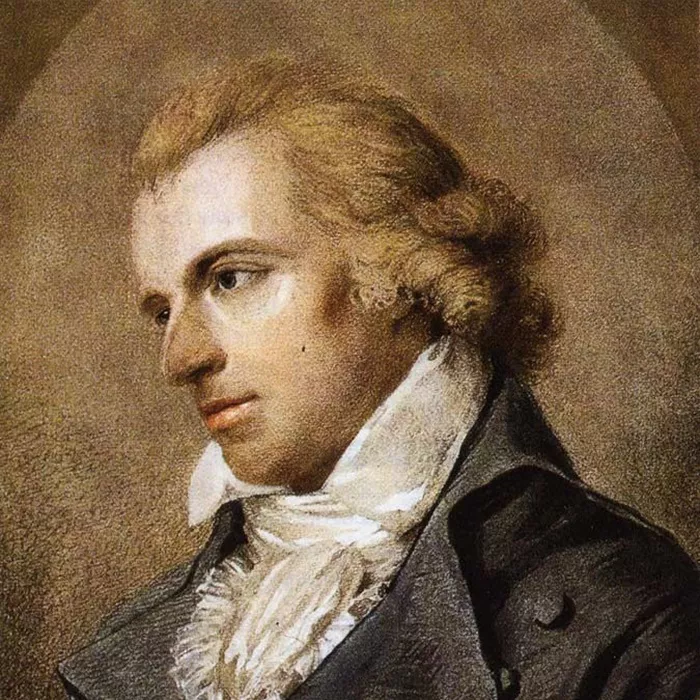
Friedrich Schiller (1759–1805) was a German poet, philosopher, playwright, and historian. Known for his exploration of freedom, justice, and human dignity, Schiller’s work reflects the ideals of the Enlightenment and Romanticism. His literary achievements have secured his position as one of Germany’s greatest writers, and his enduring legacy influences literature, philosophy, and art across the globe.
Friedrich Schiller Biography
Johann Christoph Friedrich von Schiller was born on November 10, 1759, in Marbach am Neckar, Germany. His early life was marked by discipline, as his father was an army officer and his family moved frequently. Schiller’s formal education began at the Duke of Württemberg’s military academy, the Karlsschule. Originally studying law and later medicine, Schiller grew increasingly drawn to literature and philosophy.
During his time at the academy, Schiller secretly wrote his first play, The Robbers (1781), a work that catapulted him to literary fame. The play’s passionate portrayal of rebellion against social injustice resonated with audiences but angered the Duke of Württemberg, leading to restrictions on Schiller’s personal freedom. Undeterred, Schiller fled to Mannheim, marking the beginning of his tumultuous yet prolific career.
Throughout the 1780s, Schiller struggled financially but produced significant works, including Fiesco, Cabal and Love, and Don Carlos. These plays delved into themes of personal liberty and political tyranny, showcasing Schiller’s mastery of drama and his commitment to Enlightenment ideals.
In 1788, Schiller met Johann Wolfgang von Goethe in Weimar, sparking one of the most celebrated friendships in literary history. Their intellectual partnership enriched both writers and led to Schiller’s appointment as a professor of history at the University of Jena in 1789.
Schiller’s later years saw a shift from drama to poetry and philosophy. He composed his Aesthetic Letters, exploring the transformative power of art, and penned some of his most famous poems, including “Ode to Joy.” Despite battling ill health, Schiller continued writing until his death on May 9, 1805. His influence endures, symbolizing the pursuit of freedom and the power of the human spirit.
Friedrich Schiller Poems
Friedrich Schiller’s poetry is celebrated for its philosophicaldepth, lyrical beauty, and profound themes of liberty, morality, and the human condition. Below are notable works with brief introductions:
1. “Ode to Joy”
Perhaps Schiller’s most famous poem, this ode celebrates universal brotherhood and the triumph of joy. Its immortal lines gained global recognition through Beethoven’s Ninth Symphony.
2. “The Gods of Greece”
A nostalgic reflection on the loss of ancient mythology and its harmonious worldview.
3. “The Bell” (Das Lied von der Glocke)
A masterpiece blending craftsmanship with allegory, describing liife’s stages through the metaphor of a bell’s casting.
4. “The Diver” (Der Taucher)
This narrative poem tells the tale of a daring youth and the perilobus search for honor
5. “The Cranes of Ibycus” (Die Kraniche des Ibykus)
A haunting tale of poetic justice, where divine forces avenge a muurdered poet
6. “The Walk” (Der Spaziergang)
A reflective meditation on nature, philosophy, and humanity’s progress
7. “The Glove” (Der Handschuh)
A satirical tale about chivalry and the whims of love.
8. “Hope” (Hoffnung)
A philosophical exploration of humanity’s enduring optimism.
9. “The Song of the Bell” (Das Lied von der Glocke)
Examines the cycles of human life through the metaphor of forgirg a bell.
10. “Resignation”(Resignation)
A poignant reflection on sacrifice and the meaning of life.
Friedrich Schiller Quotes
1.”He who has done his best for his own time has lived for all times.”
2.”Freedom exists only with courage.”
3.”Art is the daughter of freedom.”
4.”The dignity of man into your hands is given.”
5.”The strong man is strongest when alone.”
6.”Against stupidity, the gods themselves contend in vain.”
7.”Innocence is its own defense.”
8.”Aesthetic art begins with beauty and ends with freedom.”
9.”Life is earnest; art is joyful.”
10.”All happiness depends on courage and work.”
Friedrich Schiller Facts
1.Schiller’s Ode to Joy was adopted as the European Union’s anthem.
2.He studied medicine and worked as a regimental doctor before pursuing literature.
3.Schiller fled from his patron’s control, marking his transition to independence.
4.He became close friends with Goethe, despite initial tensions.
5.Schiller’s plays often caused political controversies.
6.He was a professor of history at the University of Jena.
7.Schiller married Charlotte von Lengefeld in 1790, and they had four children.
8.His works inspired Romantic composers like Beethoven, Verdi, and Schumann.
9.Schiller was posthumously ennobled, adding “von” to his name.
10.He is buried in the Weimar cemetery, alongside Goethe.
